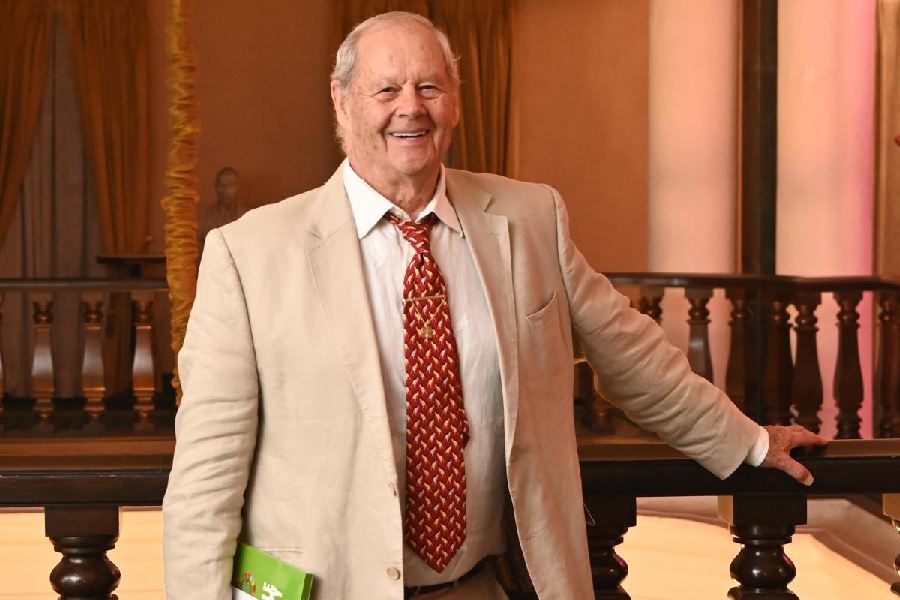Bruce Beresford speaks about his journey from Australia to Hollywood, via England and Nigeria, and return home Down Under with a couple of Oscar-winning films in his backpack. Active as ever at 83, with a film set to go on the floors, the resident of Sydney who had met Satyajit Ray over a meal as a youngster, sat down with t2 for an engaging conversation at The Oberoi Grand.
When did you reach Calcutta?
A couple of days ago. I have never been here before though I’ve been to other parts of India. I was mostly in the hotel because I’ve had emails to write. There’s a film I’m supposed to be doing in Australia in February. I’ve just been on a location survey before I came here. I had to go to Perth, in Western Australia, which is five hours from Sydney, and then I had to get on the plane to come here.
Talking about your India connection, you did a documentary titled Arts of Village India in 1970. What was that about?
I was then doing documentaries for the British Film Institute that included a number of documentaries about artists and painters. There was a big exhibition happening in London. I filmed and edited it and there was an Englishman, called Ben (Hallam) Tennyson, who was an expert on Indian village art. He did the commentary. It was quite an interesting film. That was done for the Arts Council. It was a long time ago. I have no idea what happened to that film.
So you did not have to travel to India.
No. I wish we had. There was a big collection that had travelled to England. This man, the grandson of the poet (Alfred) Tennyson, had spent many years in India and was fascinated by village art. I was very young when I made that film but he was probably in his 60s.
You took up an editing job in Nigeria.
Yes. I went to England wanting to get into the film business because in Australia then there was nothing. But when I got to England, I found that it was all run by the unions. You couldn’t work in the film industry unless you were a union member. But you couldn’t become a union member unless you were already working in the film industry. So I didn’t know what to do. Then I saw a job advertisement for a post in Nigeria. I didn’t even know where Nigeria was except that it was in Africa. Anyway, I applied for the job and was the only applicant. So I went to Nigeria and I was in a film. I was the only White man there. We made a couple of short films. It was all very disorganised. There was no funding. But it worked out very well for me as one day a group of Africans turned up in a truck and asked me: “Are you the White man who’s interested in theatre? We need a White man to play a missionary.” I agreed. When I would come on stage dressed as a missionary, the audience would go “Boo boo”. The missionary was always a villain. (Laughs)
It was good training for me because I directed some plays with the African guys and it was my first experience of directing actors. I realised later when I was making films that it was very useful. A lot of those actors were very good.
Did you go to England to be a director or an actor?
I was very young. Maybe an editor, a cameraman — I didn’t know! I had made short films in Australia. When the Civil War broke out, I had to leave Nigeria. I went back to England and luckily I landed a non-union job at the British Film Institute (BFI). The unions didn’t have any control over the BFI production board, where they made low-budget films. I was there for about six years.
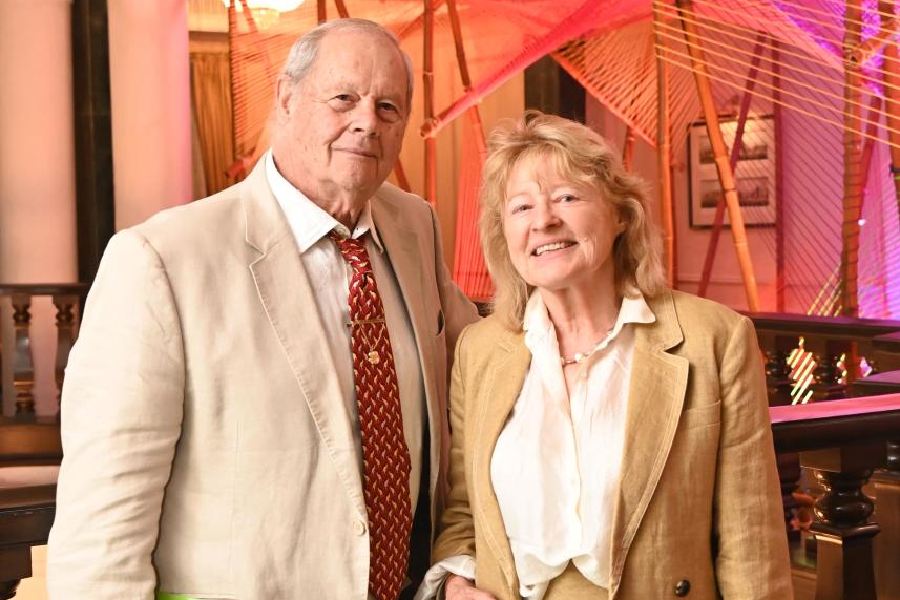
Beresford and his wife, author Virginia Duigan
You produced works of first-time directors, right?
Yes. The production board had a fund which was aimed to help young people get going. I think it was because the unions wouldn’t let people in that the government set up this fund. I was like a one-man executive. I had to keep in mind what money we had, which wasn’t much. I had to read all the scripts that came in — there were hundreds of them — and I had to propose the ones that were technically feasible to a committee which was chaired by Sir Michael Balcon, a famous producer at Ealing Studios. They were very open to new ideas. It started the careers of a lot of people like Ridley Scott, Tony Scott, Stephen Frears, Nicholas Bloomfield… Not just directors but also cameramen and editors.
Did the experience of being a producer help you to be disciplined in filmmaking?
It worked out very well for me because when I went back to Australia and I wanted to make feature films, the available budget was very small. I knew how to do it as I had so much experience doing low-budget films. I’d say I can make this film in $250,000 and everyone would say: “No, you can’t!” In fact, I can still do it. (Laughs)
When did you shoot your first feature Adventures of Barry McKenzie?
While I was in England I heard that the Australian government was setting up a fund to finance films. So I told a friend who had written a comic strip called Barry McKenzie that we should go to Australia and make a film adapted from the comic strip. He agreed and we applied to the government. The film we made was very popular.
It made a lot of money, right? The first film to make one million dollars at the box office in Australia.
Not for me. (Laughs) It got me established but the reviews were terrible. The critics didn’t like it. I did a sequel to it. That was a mistake too. It was also popular but the critics didn’t like that either.
It’s an eternal dilemma for a filmmaker, right? What should one be happy about — critic’s praise and box office failure or the other way round, in case you can’t have both?
I have realised that if you really want to get ahead and you have a choice between a film that makes a lot of money and a film that the critics like, make the one to please the critics because you’re likely to get more work from the praise. Everybody in Australia saw the Barry McKenzie films but not a single critic liked it. And I got no work. Then I made a film called Don’s Party (1976), which got good reviews. I did another film called Breaker Morant (1980), on the Boer War, which nobody saw but the critics liked. Then I started getting calls from Hollywood!
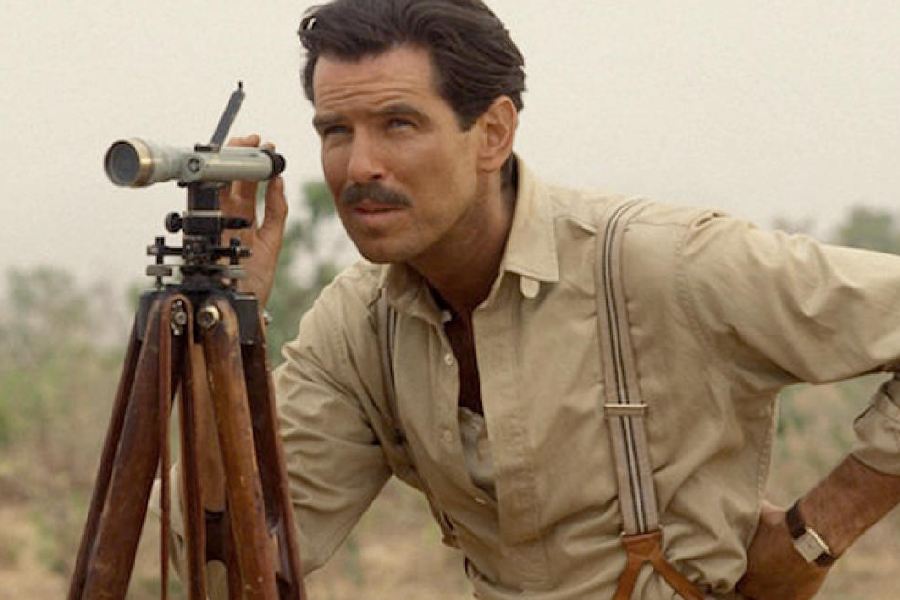
Pierce Brosnan in Mister Johnson
Tender Mercies (1983) with Robert Duvall was your first Hollywood film, right?
Yes. It got a couple of Academy Awards (five nominations, two wins). But it didn’t make any money.
Some films, like Driving Miss Daisy, did generally get good reviews and were very popular. It is fabulous if you get good reviews and people see it too. Another film of mine, Double Jeopardy, was very popular across the world but did not get a single good review.
Coming to Driving Miss Daisy, did you see the play and decide to do the film?
Richard Zanuck, the producer, called me in Australia. I think he had seen Breaker Morant, which was also adapted from a play. He asked me to come to New York and see the play (written by Alfred Uhry). It was a masterpiece! I said I could make the film but wasn’t sure if anyone would see it as it was just an old lady and an old Black man talking in the kitchen! But it did very well everywhere, except in England.
How did you decide on the casting?
Morgan Freeman was in the play but he wasn’t a film actor. He had only done a supporting role before in a film. But Zanuck was an upright man and agreed to use him. The studios didn’t want him. Jessica Tandy was a stage actress. They didn’t want her either. But Zanuck stuck to his guns and we got a Canadian producer.
Did the Academy Awards come as a surprise?
I was surprised and pleased. The audience loved it, it was so well-acted. And we did a good job of filming it. It is quite hard to direct something that limited, with just three characters. A film like Double Jeopardy is easier to direct.
You have directed two Bonds, that is actors who also played James Bond.
Yes, Pierce (Brosnan) was in a couple of my films. And Sean (Connery) was in one. The ones with Pierce were good. They are showing Mister Johnson (1990) here (at the film festival). I sometimes think it is my best film.
You wouldn’t recommend A Good Man in Africa (1994)?
No. It was a film where everything went wrong. We shot in the wrong place, the script was never workable. I realised it while I was directing it. The book, on which it was based, was a series of jokes. There was no continuity in plot or theme. Sean (Connery) was very nice and worked hard. But I knew it was a mistake.
You have worked with some of the biggest stars in Hollywood. Richard Gere in King David…
Have you seen it?
No.
You don’t want to see it. It was a disaster! That film almost ruined his career. But Richard Gere is an intelligent, cultured man with a good sense of humour. He is over 70 now. What was that film with three sisters? Crimes of the Heart (1986). That was good. Big stars — Diane Keaton, Jessica Lange, Sissy Spacek....
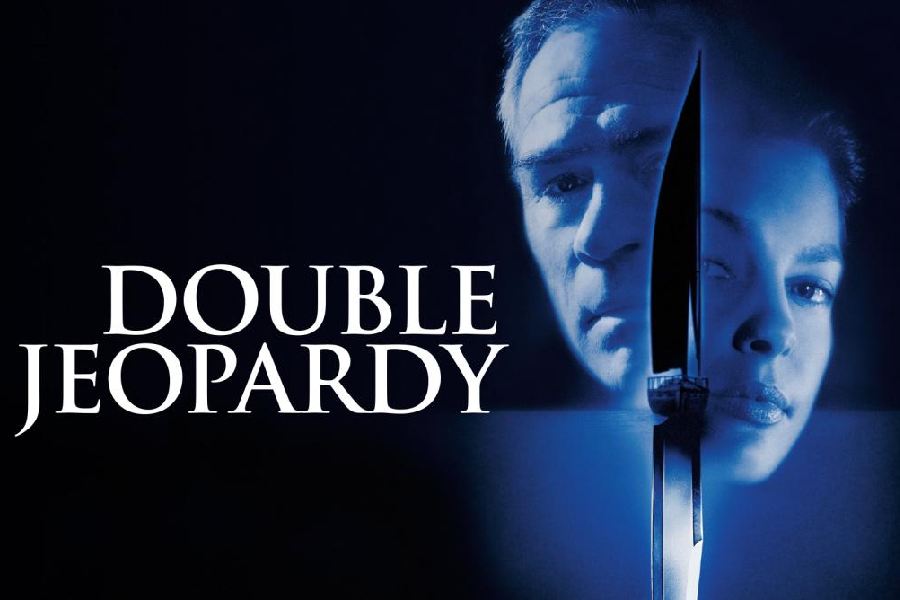
A poster of Double Jeopardy
How would you remember each of these stars?
Albert Finey was in Rich in Love (1992). He was an unpretentious man. He’d find out everyones names on the crew, he’d go fishing on the weekend with all the grips and the carpenters. He was very unspoilt and genuine. Pierce (Brosnan) was a bit like Albert — very amiable, without affectation, a pleasant and warm personality. He is a very good actor. I wanted to do another film with him but did not get the money.
He was a less macho and more intuitive Bond.
Yes. He did three or four Bond films and got sick of it (laughs). He lives in Hawaii; he emailed me recently.
You did a second film with Morgan Freeman.
A thriller. I saw it (The Contract, 2006) recently. It was on television in Australia. And I thought it was quite good. Morgan is a very professional actor who can fit into anything. Big stars become big by being cooperative. They listen to the director.
You also worked with Sharon Stone in Last Dance (1996).
She’s very nice, very pleasant, very bright. We are still friends. But the film didn’t turn out right. The script was wrong.
Your autobiography has a curious title: Josh Hartnett Definitely Wants To Do This... True Stories From A Life in the Screen Trade.
Josh Hartnett is an actor who, at the time I wrote the book, was becoming a big star. But he didn’t! (Laughs) The people who were getting the money for a film told me: “Josh Hartnett definitely wants to do this”, which means they’d get the money if Josh Hartnett did the film. So I met him a couple of times. He was boring beyond belief. I never figured out if he really wanted to do the film as we’d sit down and all he’d tell me is how wonderful he was. The reason he didn’t become big, I think, is because he was arrogant — “I am the serious artiste and you are the money-making upstart.” At the time, he was known all over the world but now he is forgotten though I still see him in films from time to time. If the book is reprinted we’d do away with the name.
There was a phase after the pandemic when it was thought that only big superhero and action films would work in the theatres. For the rest, there could only be OTT platforms.
For a while, those films were made for a young audience. But over the last year, there has been a swing the other way. I have seen a couple of very good films where nobody could fly and there were no monsters. Very good character studies. (During the pandemic) there was such a tremendous demand for products on the streaming channels, I think, they rushed a lot of films into production just to get something on screen. There are series which go on and on. I lose interest once it gets beyond three episodes. My wife (Virginia Duigan, an author) watches these series, which go on for 10-12 hours, but I can’t! I would rather read a book.
I did some in America for streaming services — Pancho Villa (the HBO film And Starring Pancho Villa As Himself, starring Antonio Banderas) and Bonnie & Clyde — but they were about three hours long.
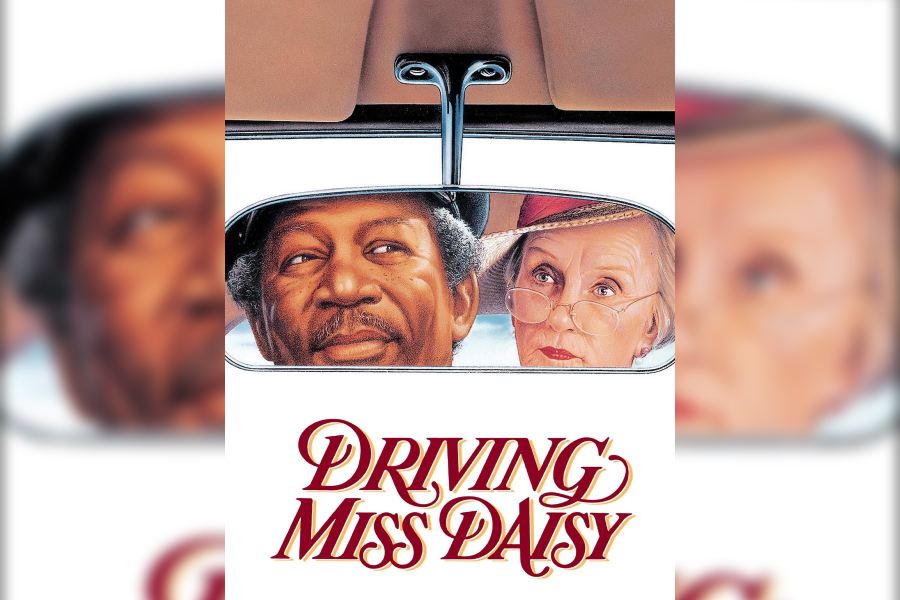
A poster of Driving Miss Daisy
You have also directed operas. How is it different from plays?
In a play, someone can say: “What if I sit down here?” In opera, they have to keep singing as the music keeps going no matter what they do. So you have to direct within the parameters of the music, which I find rather exciting. The music reinforces the emotion. The last one I did was Macbeth. It was a good libretto and the music was the work of genius. But you can’t do opera for money. There is no money!
What do you do in your free time?
We live in Sydney in a house on the water. So I go kayaking a lot all over the harbour. I am a good kayaker. I have a little dock where I carry the kayak to, jump in and paddle off. The harbour is the biggest in the world so there are a lot of places to go to.
Congratulations on Australia winning the ICC Men’s World Cup!
It was all everyone was talking about in Australia because we didn’t think they’d beat India (smiles). Indian cricket is very popular in Australia. I used to go to all the big games with my father until I was about 17. I have seen (Sunil) Gavaskar, the great West Indians, the English... Keith Miller was my favourite. He was very stylish. Here (in Calcutta) when I was going around yesterday, there were young boys playing cricket everywhere!
Have you watched any Indian cinema?
I was always a great fan of the Satyajit Ray films. I think he is one of the two or three greatest directors of all time. I met Ray in London. I was at the British Film Institute when he came to give a talk. We had lunch one day. I was about 24-25 but I was in charge of the film production team. He was very courteous. For me, it was like meeting an idol. I had seen the Apu Trilogy many times. I still do.
Of the recent films, my favourite film is Lagaan. I have two DVDs of it. One is longer than the other. They put some extra scenes in it (laughs). I find the film very joyous, it has tremendous spirit. It is very uplifting and exciting to watch. The songs and dances are very exhilarating. I have also seen some epics, some big battle films.

